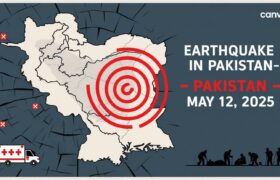Pakistan was once again rattled by a moderate earthquake on Monday, May 12, 2025, at approximately 12:56 PM local time. The tremor, which registered a magnitude of 4.6 on the Richter scale, was reported across various northern regions of the country. According to the United States Geological Survey (USGS) and VolcanoDiscovery, the quake occurred at a shallow depth of 10 kilometers, a factor that can intensify surface-level shaking despite moderate magnitude.
The epicenter of the quake was located in northern Pakistan, although the exact coordinates are still under validation. The Pakistan Meteorological Department (PMD) has since confirmed the seismic activity and urged citizens to remain calm while following safety protocols.
📌 Key Details of the May 12 Quake
-
Date: Monday, May 12, 2025
-
Time: 12:56 PM PKT (Pakistan Standard Time)
-
Magnitude: 4.6
-
Depth: 10 km (shallow)
-
Epicenter: Northern Pakistan (exact coordinates being verified)
-
Felt in: Islamabad, Rawalpindi, Abbottabad, Mardan, and nearby rural areas
🏘️ Local Reactions and Early Reports
The tremor was felt in urban areas such as Islamabad, Rawalpindi, and Peshawar, where office workers and schoolchildren momentarily evacuated buildings. People in several districts rushed outside in panic, fearing a repeat of more devastating quakes from the past.
Luckily, no major structural damage or casualties have been reported as of this writing. The NDMA (National Disaster Management Authority) and local disaster response units are conducting field assessments to check for minor damage in rural and mountainous zones where landslides may occur.
🕊️ A Region Under Seismic Stress
This earthquake comes just two days after a stronger quake of 5.7 magnitude struck the region on Saturday, May 10, followed by another 4.0 magnitude aftershock later that day. The sequence of tremors is raising concerns among geologists and disaster response agencies about increased tectonic movement in the region.
Pakistan lies at the boundary of the Indian and Eurasian tectonic plates, which makes it highly prone to seismic activity. The pressure from the Indian plate moving northwards collides with the Eurasian plate, often triggering earthquakes, particularly in the Hindu Kush, Karakoram, and Khyber Pakhtunkhwa regions.
🏥 Emergency Response and Preparedness
Following the quake, emergency protocols were activated in several northern districts. The Punjab Emergency Services (Rescue 1122) and KP Disaster Management Authority confirmed that teams were dispatched to high-risk areas to inspect infrastructure and check for any potential injuries or building cracks.
Hospitals have been asked to stay alert for incoming trauma cases, though no serious injuries have been reported. The NDMA emphasized that while this quake did not cause damage, people should remain vigilant, as aftershocks are possible in the coming hours or days.
💬 Public Response and Social Media
The earthquake sparked immediate buzz on social media, with hashtags like #PakistanEarthquake, #Tremors2025, and #PrayForPakistan trending across X (formerly Twitter) and Instagram. While many users shared videos of swaying ceiling fans and people evacuating buildings, others expressed concern over the recent frequency of seismic events.
Misinformation also began circulating, with some falsely linking the quake to political or religious causes. Scientists urge the public to trust geophysical data and expert sources, rather than sensational or superstitious claims.
🧠 Expert View: What Does This Mean?
Seismologist Dr. Afshan Rehman from Quaid-e-Azam University explained,
“What we’re observing is not unusual for Pakistan. This region experiences dozens of quakes each year—some perceptible, others not. The cluster of tremors we’re seeing may or may not lead to a larger seismic event, but preparedness is key.”
She added that urban planning, earthquake-resistant infrastructure, and public awareness campaigns are essential to minimizing loss of life and property in future events.
🧭 Final Thoughts: Stay Calm, Stay Informed
While the May 12 earthquake in Pakistan has so far spared the country from major tragedy, it serves as a reminder of the region’s seismic vulnerability. Authorities continue to monitor the situation closely, and further updates will be issued should aftershocks occur.
For now, citizens are urged to remain cautious, avoid spreading rumors, and prepare safety kits in the event of future tremors.



